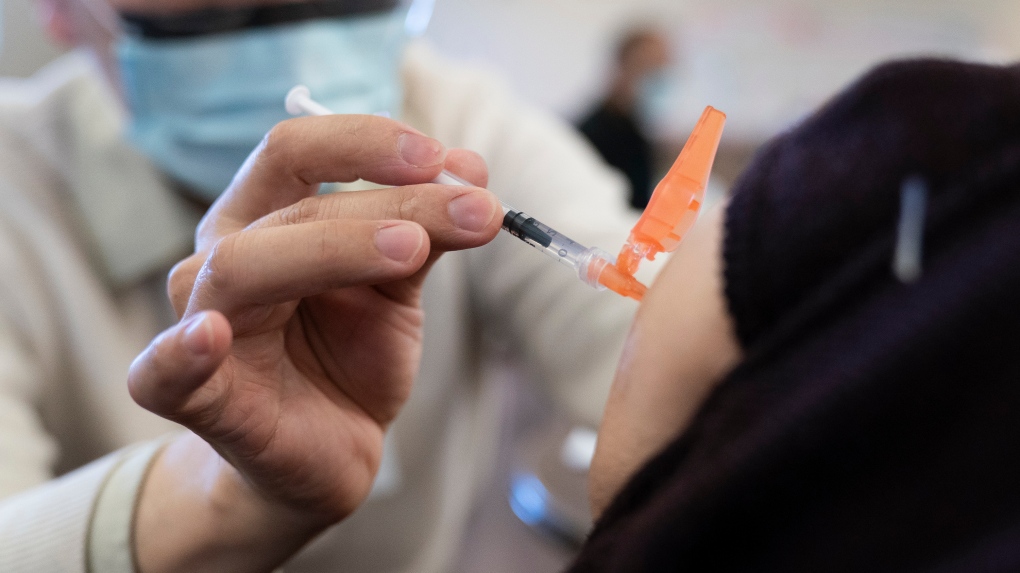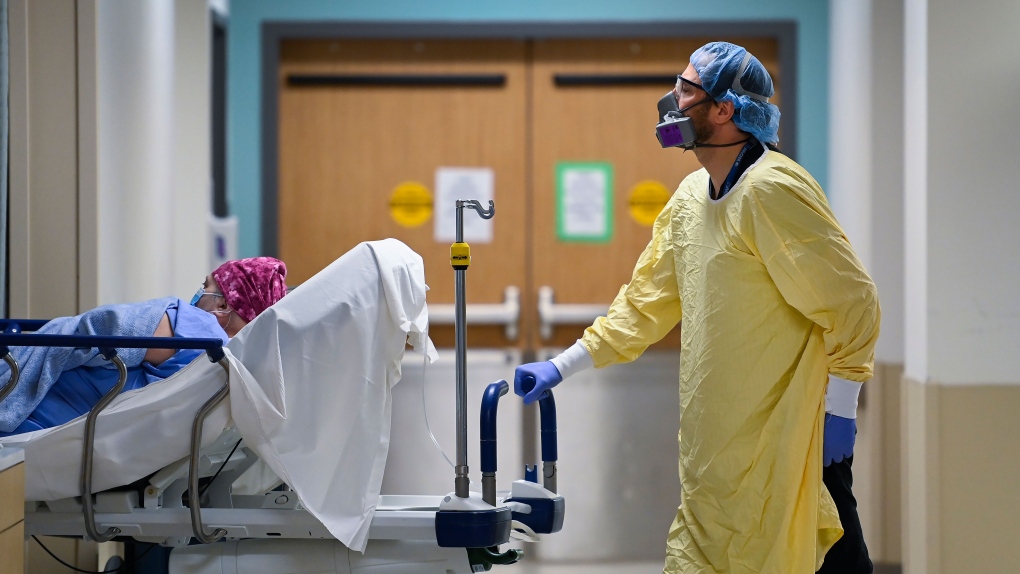How Ontario's 'breakthrough' COVID-19 cases show that vaccines work
Since the province began vaccinating some of the most vulnerable populations in Ontario, COVID-19 trends have dropped dramatically compared to the peak of the third wave.
While even fully vaccinated individuals can still contract the virus and end up in a hospital, experts say those incidents will become fewer and further between as Ontario’s rollout continues.
An infectious diseases specialist in Hamilton is planning on studying just how many lives have been, and will be, saved as a result of a vaccination.
"(I'll) go through the Ontario data that's out there and just try to see the 'what if' scenarios, if we didn't vaccinate in our third wave, if we didn't vaccinate long term care," Dr. Zain Chagla, a physician at St. Joseph's Hospital, said. "There probably would be 1,500 (or) 2,000 more deaths, but we never will count those."
Chagla says he wants to reframe how people think about reported COVID-19 cases in vaccinated individuals.
This comes after a COVID-19 outbreak this week at Toronto Western Hospital, which ended up impacting some patients and staff who had either one or both doses of a COVID-19 vaccine.
So far, four staff members and four patients have been impacted, but all of them are reporting mild or asymptomatic cases.
"We would love to have no COVID-19, but if it is a mild illness, then it doesn't really affect that person's hospitalization and they're discharged home appropriately, then the vaccines are doing what they're supposed to be doing," Chagla said. "Many of these headlines don't emphasize the number of people that these vaccines either prevented transmission for... or other people that that it prevented significant medical illness, ICU stays, or death from."
Much of the data Chagla will focus on comes from Public Health Ontario, which details how many breakthrough cases—infections identified in people who have received two doses of a COVID-19 vaccine at least seven days prior to infection or one dose 14 days prior—the province has recorded and what the severity of each case was.
The latest available data ranges from December 14, 2020 to June 12, 2021, and shows how much of an impact vaccines are having on seniors in Ontario.
During that time period, there has only been one person aged 80 or older who has ended up in a intensive care unit (ICU) after being fully vaccinated, compared to 303 ICU patients in that same age group who were unvaccinated.
"Of the almost 9.4 million vaccinated individuals only 0.15 (per cent)... became infected when they were partially vaccinated and only 0.02 (per cent)... became infected when they were fully vaccinated," Public Health Ontario's report states.
 Dr. E. Kwok administers a COVID-19 vaccine to a recipient at a vaccination clinic run by Vancouver Coastal Health, in Richmond, B.C., Saturday, April 10, 2021. THE CANADIAN PRESS/Jonathan Hayward
Dr. E. Kwok administers a COVID-19 vaccine to a recipient at a vaccination clinic run by Vancouver Coastal Health, in Richmond, B.C., Saturday, April 10, 2021. THE CANADIAN PRESS/Jonathan Hayward
Dr. Ruchi Murthy is an infectious diseases specialist at Queensway Carleton Hospital in Ottawa and she points out it's far less common to become infected with COVID-19 after vaccination—and even more rare to experience a severe outcome if you do get sick.
"I think we need to take a step back and appreciate what the big picture goal was for these vaccines," Murthy said. "The goal was to reduce community transmission, it was to reduce numbers in hospitals, and it was to try to reduce severe illness and death. So far, what we've seen locally is that we're starting to see trends that all of this is happening with vaccines."
Murthy says there will never be a perfect solution to eradicating COVID-19 in the short-term, but if we can manage how sick people get and how strong the virus is, then it becomes a lot easier to live with.
"Certainly, my heart does go out to those that have still become unwell and had illness or death related to COVID infection despite vaccinations," Murthy said.
"But if you look at the vast majority of the numbers, we are seeing some wins with the... uptake of vaccines that Canadians have participated in. We're not quite out of the woods yet, though. We know that with the rising Delta variant that we do need two doses to best protect ourselves... and it's something that we all need to participate in still to get those shots in arms."
HOSPITALS STRUGGLE WITH BACKLOG AS COVID-19 PATIENTS DECLINE
As the number of COVID-19 patients in Ontario hospitals continues to decline, the head of general surgery at Sunnybrook Hospital is warning of a “huge backlog.”
"Right now, we're full tilt," Dr. Shady Ashamalla said. "There's this huge backlog, and we're able to, as soon as we're able to decompress, and there's space, then we really crank up what we do."
The pandemic has created a backlog of an estimated 15.9 million medical procedures, according to the Ontario Medical Association.
 A health-care worker wearing PPE transports a patient in the dialysis unit at the Humber River Hospital during the COVID-19 pandemic in Toronto on Wednesday, December 9, 2020. THE CANADIAN PRESS/Nathan Denette
A health-care worker wearing PPE transports a patient in the dialysis unit at the Humber River Hospital during the COVID-19 pandemic in Toronto on Wednesday, December 9, 2020. THE CANADIAN PRESS/Nathan Denette
Ashamalla says that catching up on those procedures will be a top priority through the summer and fall, there are other added complications from the pandemic, especially for cancer patients.
"We know that there was... quite a long period of time where screening for cancers really decreased across the province, that in of itself will have an impact that we don't necessarily know yet," Ashamalla said.
"We have diagnosed far less cancers this year than years past... and the only difference is really the fact that we didn't screen, which means there are many, many patients out there whose screening has been delayed, who are carrying some disease burden, who don't know it yet, who have yet to come to medical attention."
On top of that, Ashamalla says, some patients will have had a change in prognosis through the pandemic due to health-care system delays, and the effects of that won't show up until further down the road.
But for now, things are getting back on track.
"I'd like to say, with a fair bit of confidence that the worst is absolutely behind us. I know that there's a lot of anxiety around different variants, and there's a lot of anxiety around the impact and things that might happen again, in the future.... I will say that we are in a very good place. And I do believe we're on the other side of this."
CTVNews.ca Top Stories

RCMP uncovers plot to sell drones and equipment to Libya
The RCMP says it has uncovered a plot by two men in Montreal to sell Chinese drones and military equipment to Libya illegally.
Demonstrators kicked out of Ontario legislature for disruption after failed keffiyeh vote
A group of demonstrators were kicked out of the legislature after a second NDP motion calling for unanimous consent to reverse a ban on the keffiyeh failed to pass.
Tom Mulcair: Park littered with trash after 'pilot project' is perfect symbol of Trudeau governance
Former NDP leader Tom Mulcair says that what's happening now in a trash-littered federal park in Quebec is a perfect metaphor for how the Trudeau government runs things.
Government agrees to US$138.7M settlement over FBI's botching of Larry Nassar assault allegations
The U.S. Justice Department announced a US$138.7 million settlement Tuesday with more than 100 people who accused the FBI of grossly mishandling allegations of sexual assault against Larry Nassar in 2015 and 2016, a critical time gap that allowed the sports doctor to continue to prey on victims before his arrest.
Man wanted in connection with deadly shooting in Toronto tops list of most wanted fugitives in Canada
A 35-year-old man wanted in connection with the murder of Toronto resident 29-year-old Sharmar Powell-Flowers nine months ago has topped the list of the BOLO program’s 25 most wanted fugitives across Canada, police announced Tuesday.
Doctors ask Liberal government to reconsider capital gains tax change
The Canadian Medical Association is asking the federal government to reconsider its proposed changes to capital gains taxation, arguing it will affect doctors' retirement savings.
Keeping these exotic pets is 'cruel' and 'dangerous,' Canadian animal advocates say
Canadian pet owners are finding companionship beyond dogs and cats. Tigers, alligators, scorpions and tarantulas are among some of the exotic pets they are keeping in private homes, which pose risks to public safety and animal welfare, advocates say.
Thieves use stolen forklift to rip cash machine out of U.K. bank
Police in the U.K. are searching for a group of suspects seen on video using a forklift to steal a cash machine from a bank.
'There was a lot of black smoke': Crane operator sounds alarm while trapped during highrise fire in Halifax
A tower crane operator alerted emergency crews after noticing a fire on a construction site in Halifax Tuesday morning.































